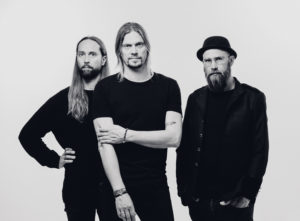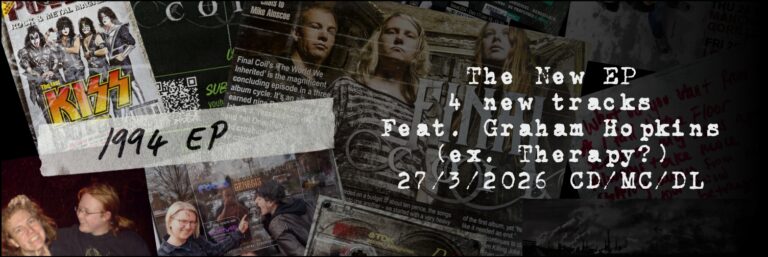One of the absolute highlights of this year’s Download Festival was undoubtedly over at the second stage when the Von Hertzen Brothers delivered a soaring, ethereal set of prog-infused rock. With the sun blazing in a cloudless sky, the band’s layered harmonies and exquisite guitar work ensnared all who fell within its range and their set; forty minutes that felt like the blink of an eye; was a joyous celebration of the power of music. We caught up with Kie and Sami shortly after for a chat about the creation of mesmerising new album ‘war is over’ and the importance of harmonies in their music.

So, the first question is that the composition of the album is quite unusual because you each went off to a summer cottage independently to work on songs and then bought those back to the band. How did that idea come about?
Kie: Well, the thing is that the place is like a really, really dear place to us. It’s a couple of hours from Helsinki and it’s the only place where you can really and truly concentrate on writing the stuff. And we have to take turns because a lot of our stuff has been written where we put parts together – this is Mikko’s part and this is Jonne’s part and let’s write together – but this time it kind of felt that we should try it out where each one takes turns and then we’d see what came out. I think, in the end, it was a really fruitful way because it’s only the beginning, you know. You come up with the first demos and then you get together and, actually, pretty early on Sami came along also and we started to work the material as a band.
Sami: Yeah, but you’d been doing the team work for a long time, so it’s not a problem that you work separately and then, when you combine, everybody knows each other so well already and you read the others so well that it’s really easy. And when you come together it’s almost all ready.
Kie: We write the instrumentation and, of course, I Know how high Mikko sings, I know how low Jonne sings, so I can pretty much write the demos in the correct key, so it’s actually a good way because…
Sami: And then, maybe the personality comes more…
Kie: Yeah, the diversity. Because, you know we have a lot of common ground, but then we also dig very different kinds of stuff. So, in a sense, being in a band for this long, it needs to have this substance of diversity. You need to be able to write different kinds of albums and not, like, the same thing over and over again.
Sami: Yeah, with these guys that’s just the way it goes. It’s not doing the same thing. There’s always some new thing up in front the whole time. So, when we ask “why we are doing this album?” (and as players we always think about it, too), it’s never like “oh, it’s business as usual!” It’s not like that.
Kie: We try to avoid the songs that we’ve already written. Yeah, the fact that a new drummer and keyboard player came in… we had to break things up and start from scratch. Not just music–wise but business-wise as well; so, it kind of defined the whole process really significantly and we were so lucky that Sami came along from early on…
Sami: I’ve known these guys pretty much since childhood. I played with them earlier, more than ten years ago, so getting together again was really smooth and easy.
Kie: Sami played on the ‘approach’ album that came out in 2006, so he’s played in VHB already on one album…
Sami: …and just working together, we didn’t have to get to know each other like “what’s your name again?!” and we got in the studio fine, it was really quick and there were no problems really.
Kie: It was the kind of album that reminded us of our first albums in the sense that we made it in a perfectly… stress-free environment. We didn’t worry about the business like “OK, this is a bad song, this has a hook…” or something like that. We just let it flow and, in the end, I’m really so happy about the album.
Sami: It’s true and I think that, without pressure from outside and because there was no time limit, like “it should be released here…” it was like we just focused on making the music to see what came from it. It makes it easier to continue for another ten… or a hundred years…
Kie: Another hundred years?!
Sami: Yeah!
Kie: I like it!
You touched on a couple of things there, one of which is that I’m a huge fan of the album as a carefully sequenced thing. Because of the way you wrote the album, did it take long to get that sequencing?
Kie: Well, this time it took… the whole process took some one and a half years. But the sequencing and stuff, it actually… of course it has to do with lyrics which always tend to come at the very end of the process. So, for example, on this album, it was only the last couple of months that we…. We tried to always concentrate on songs – the best songs. We give them a chance and then see what they want to be… they have their own lives from the beginning. So, we try to follow where the songs want to go.
Kie: So, this time, the ‘war is over’ theme – the lyric for that and there a couple of songs, the key songs on the album – the opening track and ‘Jerusalem’ also, and ‘beyond the storm’… Mikko started to… you should actually ask Mikko [at this point, Sami disappears to see if he can track down Mikko]… but the thing is… music-wise is one thing but lyric-wise, on this album especially, we needed to have the opening and the closing track on the same theme. So, actually the sequence was pretty easy in that way, the key songs were there in the beginning and the end. There were just a few arguments that this bit should be the seventh or eighth song, but yeah, it was pretty easy overall.
Kie: And yeah, I’m totally with you that the album isn’t dead as you sometimes hear about, you know “yeah – OK – only songs. No album anymore…” But we’re definitely an album band and yeah, one hour at a time listening to one album, as you said, it’s a journey and it’s a perfect… once you get into something, that’s a perfect amount of music that you can take at one time. One album, it’s a perfect form. I really like it and we’re not going to leave that at all, even though it might be easier to experiment if you do just one song and you don’t have to experiment with the whole album and you don’t have to play around with it, but yeah, we’re truly an album band. We’ve always been and will always be!

The other thing that you raised, that I’ve always been interested in, is that I love the harmonies in the band. Working on harmonies is always a challenging thing – as you say you know the key your brothers sing in – but getting it all to flow in the studio is much harder – how long do you work on getting the harmonies right for each record?
Kie: I would say three to four weeks. Yeah. That’s a fair amount of time that you have to dedicate to that. We have our own methods to get it to sound like VHB already. So we do the same tricks with certain kind of layering and the recording and stuff. [Sami returns]He’s asking about the…
Sami: mixing?
Kie: No, no, about the harmonies.
Sami: Aahhhhh!
Kie: So, we have our own way to do those and, yeah, three to four weeks. And it’s always like, yeah, the harmonies are really one instrument which you really… we usually try to avoid the most obvious harmonies. Like we don’t want to just put the chords, and we always try to put the counter-melodies in. So, that’s something that I’m really glad to hear you say that you’ve paid attention to, because it’s something that we really try to value and we put a lot of effort into them to get it into our own style.
Sami: When you do it for years, you know your brothers so well, that it fits. It’s kind of like a small choir thing, of course, and if you stress about it a little bit, like not doing the easiest thing, the ability goes higher all the time. I have to say that having Robert (Engstrand) on keys and vocals is a great advantage. He’s a really good singer also, so he’s the fourth brother in that sense, so it’s very good for the live thing.
Kie: I’m really surprised that bands nowadays do it so little. I mean, why? It’s a fucking great, great instrument and when we go on stage and everyone’s singing, it really adds to the set a totally new dimension. Everybody’s on the mic…
Sami: Maybe, the harmony is not the thing today because it’s really melodic and some people might think it’s not modern enough for them. But it’s really strong for the song – the melody.
Kie: The bands we’ve been listening to – the most influential bands are like the Beatles and Queen and, you know, these kinds of bands… the eagles and all these great, great bands, especially with harmonies. How do you use that as a kind of composing dimension? Yeah…
Sami: It’s a good thing, it’s a special thing for us…
Kie: It makes it stronger…
Sami: I will start singing one day!
Check out the amazing video clip for ‘War is Over’ created by Andy Pilkington of Very Metal Art



